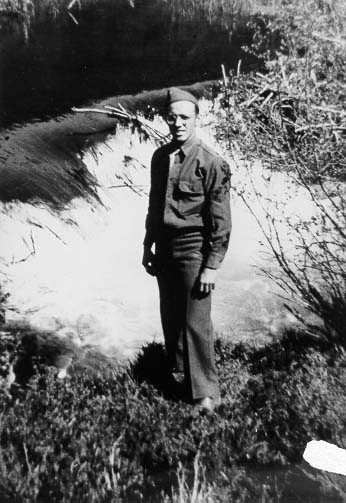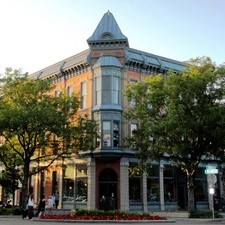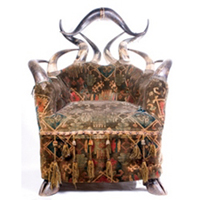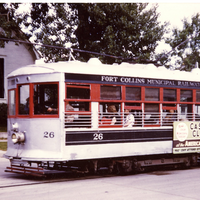Training for Night Fighting and Impressing the Sergeant:
Qualifying to Join the European Invasion, A Reminiscence
Training for Night Fighting and Impressing the Sergeant:
Qualifying to Join the European Invasion, A Reminiscence
Harold Kennedy
December 21, 1994
Interviewer: Rheba Massey
"Our division was a night-fighting division. I think we were the only one in the army then and probably later." The training involved many nights of simulated attacks, often in rain and mud. Exercises included training in "night sounds", sounds that would give the enemy away. Units would scrimmage against each other. Blanks were used, but it was still very noisy and somewhat frightening and the men resented it. Even 25 mile marches were conducted at night.
Night training was particularly hard on young Kennedy who had poor vision, which was hampered further by rain on his glasses. Kennedy remembers that not many men and none of the officers wore glasses. To make matters worse, Kennedy was the smallest man in the company; and although he did not know it until years later, his name was on his platoon sergeant's list of those who were too small or not strong enough to make it in combat and who would not be shipped out with the division for the coming European invasion. However, one day Kennedy impressed his sergeant. He proudly recalls he was in "splendid shape" and "quite the gymnast," so one day his sergeant saw him doing a handstand on his bunk.
Kennedy further qualified for combat when he was chosen to demonstrate that a small man could defend himself against a larger man in hand-to-hand and threw a 220 pound football player over his head. "Despite his football background he landed wrong and he broke his collar bone. He was a really wonderful guy. He thought that was probably the biggest joke he'd ever had played on him. It was a profitable joke for him, I suppose. It meant, of course, that he was done with any training exercises." Kennedy got to be part of the invasion.
His division was assembled in late August of 1944 and his unit was shipped overseas on a captured German ship, the SS Lejeune. "We were part of a large convoy; you could see ships for as far as you could see." Kennedy was one of the lucky few who did not get seasick on the voyage of some 8 to 10 days.
The Americans had landed in Normandy in June; the 104th infantry division was the first combat unit to land directly in France. "We landed in Cherbourg where there had been heavy fighting. This was our first sight of the kind of destruction that war visited upon cities. The town was all smashed to pieces; the port facilities were damaged beyond repair."
Kennedy's division was to be part of an "infantry slugging match with the Germans across western Holland ... my particular regiment was at a town called Malines or Mechlin. It was outside here that we began having our first combat with the Germans." The problem in fighting into Holland was that the Germans had opened the dikes and pumps were not working, so the whole area was flooded. "The fields were one big quagmire." The area consisted of "polders," which are lands enclosed by dikes, which are massive earthworks, some large enough to have a village on top. The fighting was from dike to dike. "Of course, you couldn't dig a fox hole -- it would just fill up with water." Instead the troops used the brick buildings as fortification and battles resulted in the Dutch villages being smashed to pieces with many Dutch civilians being killed.
As many of the Dutch could speak German, Kennedy, who had been trained in this language, served as interpreter. "The farmers were trying to maintain their operation. It's unbelievable -- they'd milk cows when there was a battle going on."
"People try to cope even in the worst circumstances." The Germans had dug and camouflaged trenches all along the tops of the dikes. The Americans relied very heavily on artillery before attacking. "Of course, this not only killed Germans, it killed all the farm animals." Kennedy recalls "hundreds and hundreds of beautiful Holstein cattle just lying around all over the place."
His division, which was fighting by this time with Canadian and British troops eventually reached the objective of the Maas River, beyond which the Germans had retreated. At this time Kennedy's fluency in German was important as they were taking large numbers of prisoners of war, many of them surprisingly young. "They had these kids in cadet units - thirteen, fourteen, fifteen years old! When the war started going bad, they started throwing them against us."
Kennedy remembers someone bringing in a prisoner who was yelling, "Mother! Mother! Mother!"
After finishing their job in Holland, the 104th Division relieved the 1st Division at Aachen, Germany, which is close to Belgium and Holland. Kennedy supposes the city must have been 300,000-400,000 in those days, before the town itself was almost completely evacuated by the Germans. The downtown part was completely destroyed. "It was just flattened."
Kennedy said Aachen is famous for a sign in German quoting Hitler, "Give me ten more years and you won't recognize Germany."
"It was true, but in a different way than he thought."
Kennedy's division engaged in bitter fighting on a front outside of Aachen, moving toward the Rur River. Their objective was to get a line on the river for a jumping off point for a major battle to proceed to the Rhine River. "Battles there were town by town and river by river ... Our division, being a night fighting unit, would attack at night. As a consequence, our troops would be into a German city before they knew we were in there."
"The Germans resented night fighting; one German lieutenant -- and some others too -- complained it was just plain unfair to fight at night. I thought it was highly amusing. Probably he thought it was unfair because they didn't think of it!"


Preserving the history of Fort Collins, Colorado & the Cache la Poudre region






